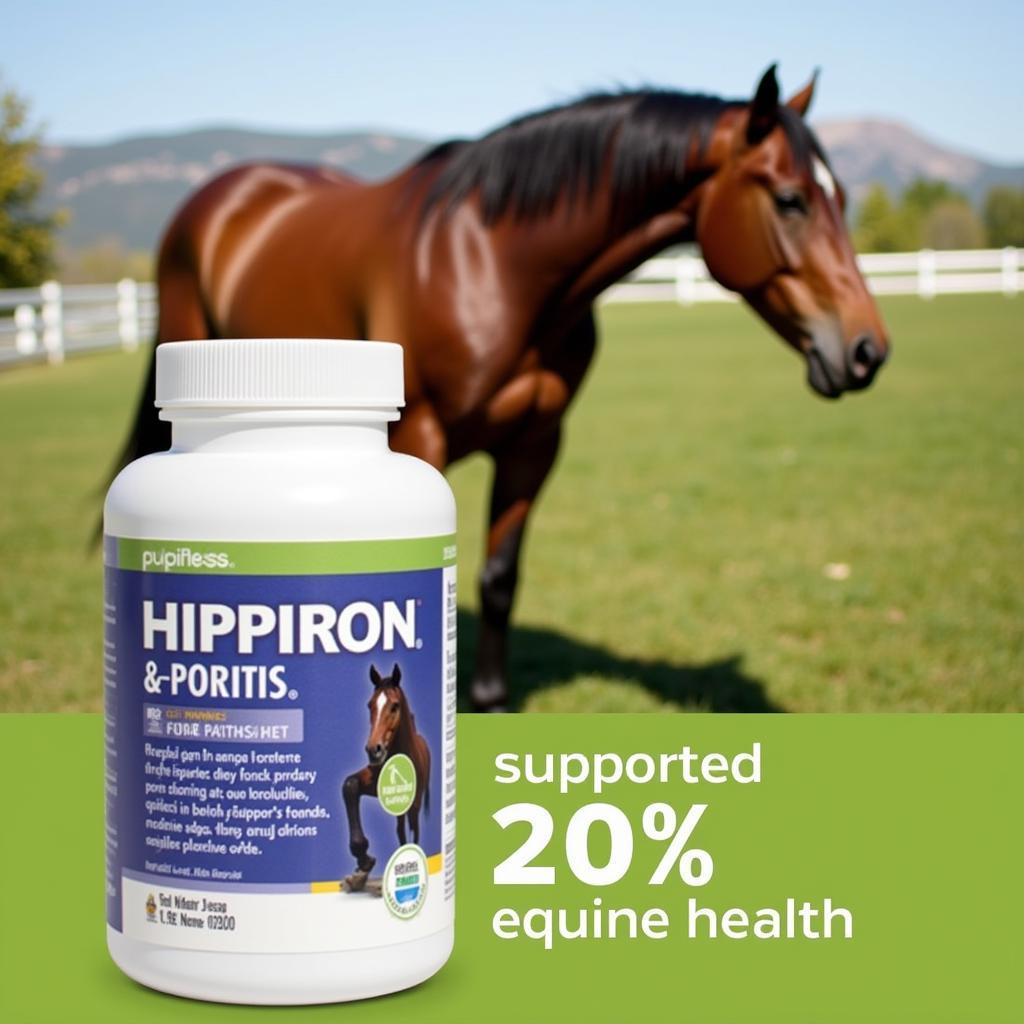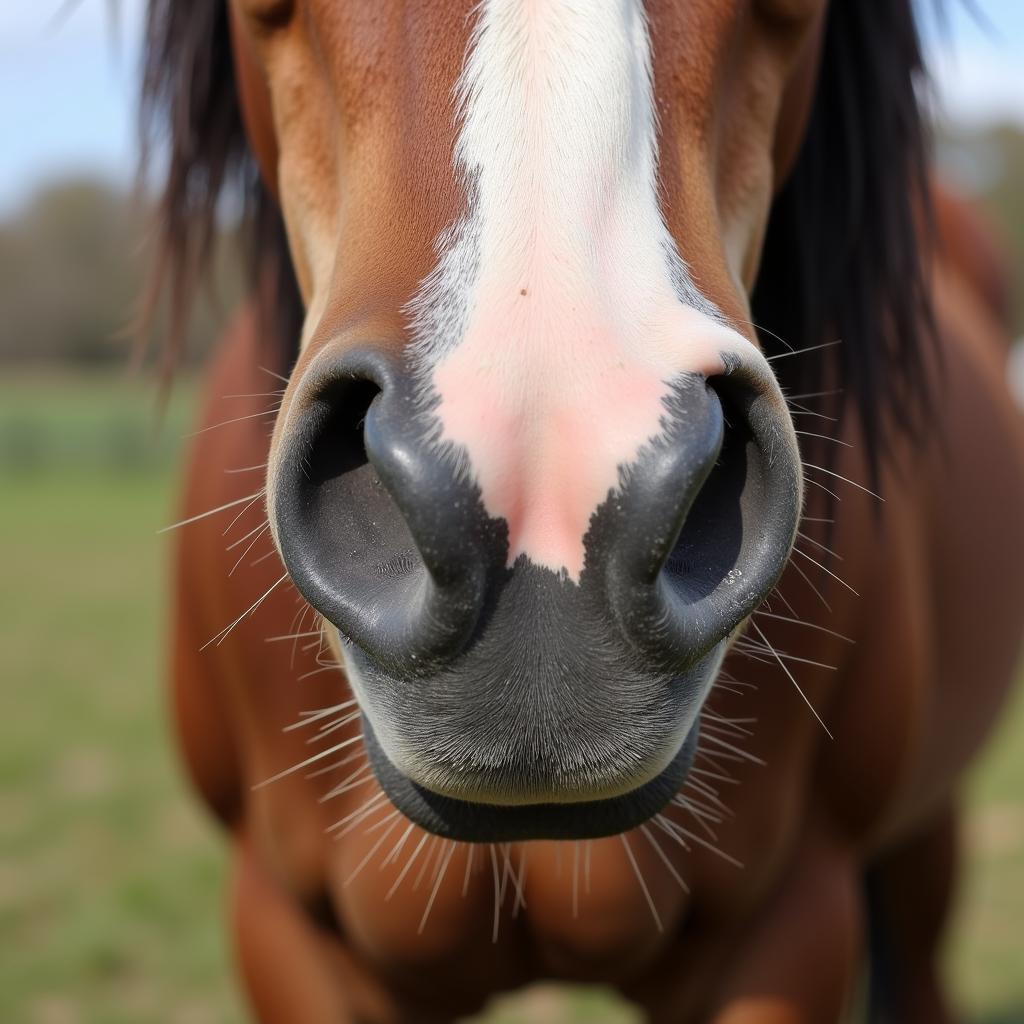Hippiron For Horses is a crucial supplement to consider for maintaining their overall health. This guide delves into the benefits, usage, and important considerations for incorporating Hippiron into your horse’s diet. We’ll explore the various aspects of this supplement and provide you with the knowledge you need to make informed decisions about your horse’s well-being.
Understanding Hippiron and Its Benefits
Hippiron is a supplement often used to support horses’ iron levels and red blood cell production. It can be particularly beneficial for horses with anemia, those undergoing intense training, or those recovering from illness or injury. Iron is essential for oxygen transport throughout the body, playing a vital role in energy production and overall performance. A deficiency in iron can lead to fatigue, weakness, and decreased athletic capacity. Hippiron can help replenish iron stores and support healthy red blood cell formation, leading to improved energy levels, stamina, and overall vitality. However, it’s crucial to remember that supplementation should always be done under the guidance of a veterinarian.
Horses experiencing rapid growth phases, pregnant mares, and lactating mares may also benefit from Hippiron supplementation to meet their increased iron demands. These life stages often require higher levels of iron to support the development of the foal and the mare’s overall health.
 Hippiron supplement for horses
Hippiron supplement for horses
Administering Hippiron Correctly
The correct dosage of Hippiron for horses depends on several factors, including the horse’s age, weight, health status, and the severity of any iron deficiency. It’s essential to consult with your veterinarian to determine the appropriate dosage and duration of supplementation for your individual horse. Over-supplementation with iron can be harmful, so following your veterinarian’s recommendations is paramount. Hippiron is typically administered orally, either mixed with feed or given directly using a syringe. Always follow the instructions provided on the product label or as directed by your veterinarian. Monitoring your horse for any adverse reactions is also essential.
While Hippiron can be a beneficial supplement, it’s not a replacement for a balanced diet. Providing your horse with high-quality forage, appropriate grain, and access to fresh water are crucial for their overall health and well-being.
Signs of Iron Deficiency in Horses
Recognizing the signs of iron deficiency in your horse is crucial for early intervention and prevention of further complications. Some common signs include lethargy, pale gums, poor coat condition, decreased appetite, and reduced performance. If you notice any of these symptoms in your horse, it’s essential to consult with your veterinarian. They can perform blood tests to determine if your horse has an iron deficiency and recommend the appropriate course of action, which may include Hippiron supplementation.
 Iron deficiency symptoms in horses
Iron deficiency symptoms in horses
“Regular bloodwork is essential for monitoring your horse’s overall health, including iron levels,” advises Dr. Emily Carter, DVM, specializing in equine internal medicine at Equine Wellness Center. “Early detection of iron deficiency allows for timely intervention and can prevent more serious health issues.”
Potential Side Effects and Precautions
While Hippiron is generally safe for horses when administered correctly, some potential side effects can occur. These may include gastrointestinal upset, such as diarrhea or constipation. In rare cases, allergic reactions can also occur. If your horse experiences any adverse reactions after receiving Hippiron, discontinue use and contact your veterinarian immediately.
“It’s always best to start with a lower dose of Hippiron and gradually increase it as needed, under veterinary supervision,” recommends Dr. Sarah Mitchell, PhD, Equine Nutritionist at the University of Equine Sciences. “This helps minimize the risk of side effects and allows you to monitor your horse’s response to the supplement.”
Conclusion
Hippiron for horses can be a valuable tool in supporting iron levels and overall health. However, it’s crucial to remember that supplementation should always be done under the guidance of a veterinarian. By understanding the benefits, usage, and potential side effects, you can make informed decisions about incorporating Hippiron into your horse’s diet and ensure their well-being. Remember to consult with your veterinarian for personalized advice and guidance.
FAQ
-
What is Hippiron used for in horses?
Hippiron is used to supplement iron levels and support red blood cell production in horses. -
What are the signs of iron deficiency in horses?
Signs include lethargy, pale gums, poor coat condition, decreased appetite, and reduced performance. -
How is Hippiron administered to horses?
Hippiron is typically administered orally, mixed with feed or given directly with a syringe. -
What are the potential side effects of Hippiron?
Potential side effects include gastrointestinal upset and, in rare cases, allergic reactions. -
Can I give Hippiron to my horse without consulting a veterinarian?
No, always consult your veterinarian before giving any supplements to your horse. -
How do I determine the correct dosage of Hippiron for my horse?
Your veterinarian will determine the appropriate dosage based on your horse’s individual needs. -
What should I do if my horse experiences side effects from Hippiron?
Discontinue use and contact your veterinarian immediately.
Need help? Contact us at Phone Number: 0772127271, Email: [email protected] Or visit us at QGM2+WX2, Vị Trung, Vị Thuỷ, Hậu Giang, Việt Nam. We have a 24/7 customer service team.